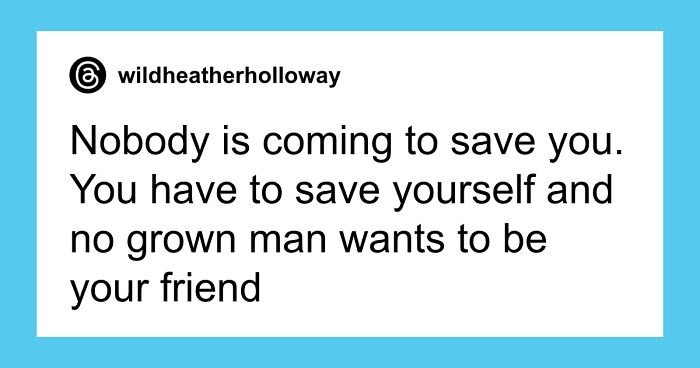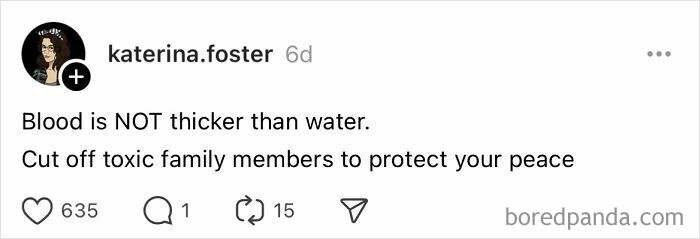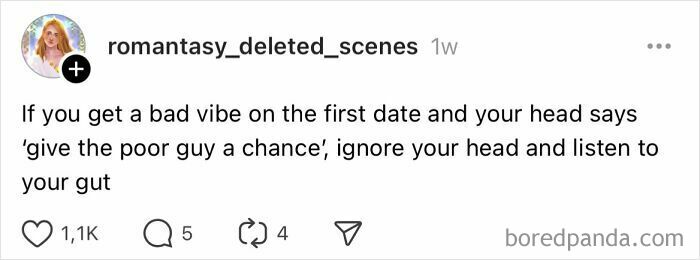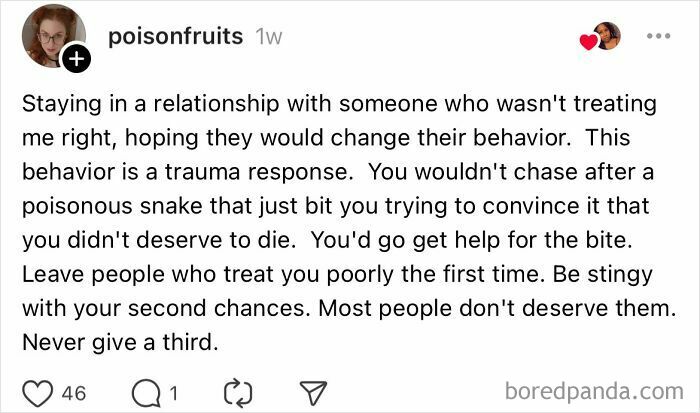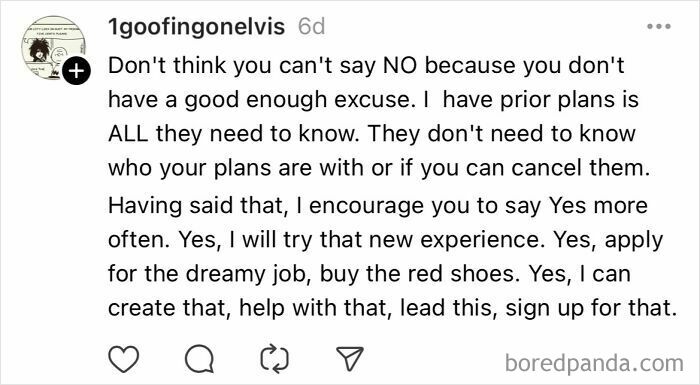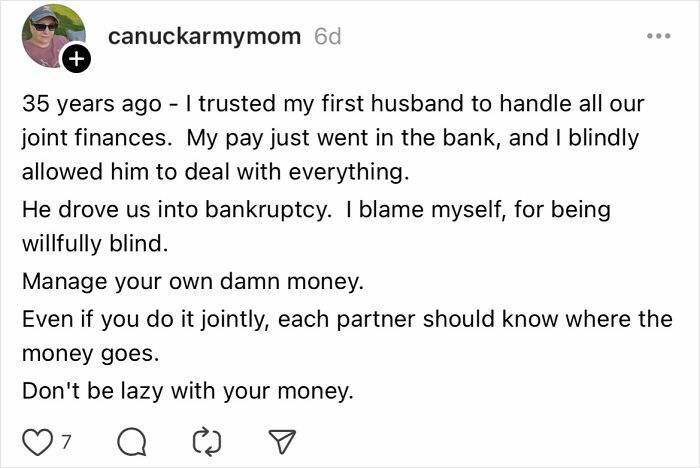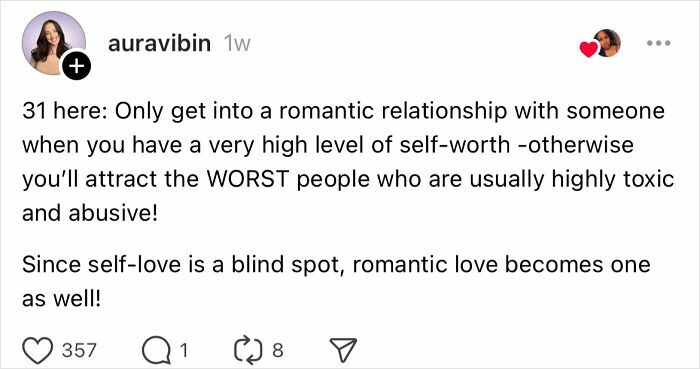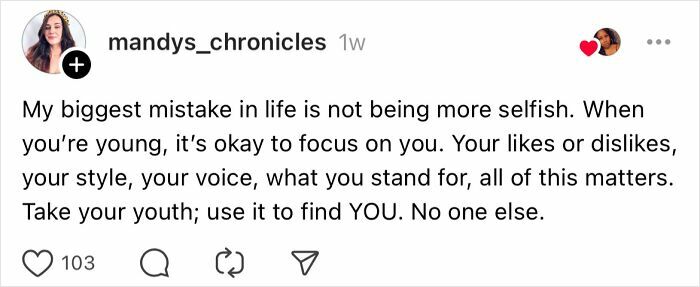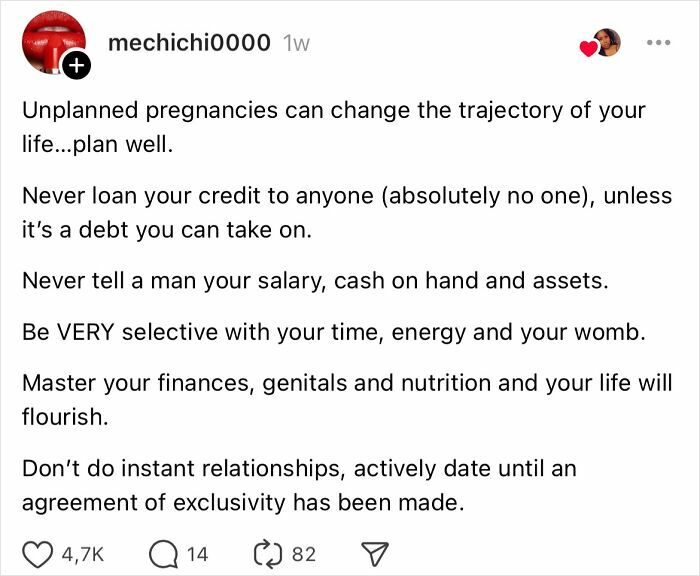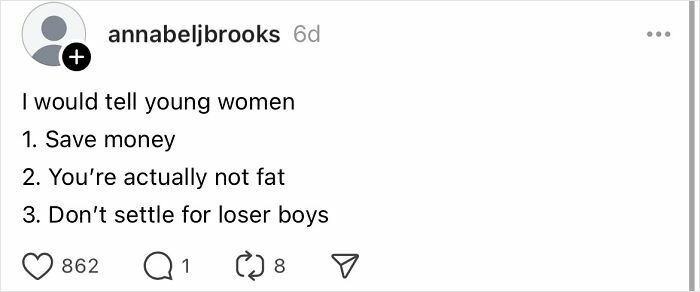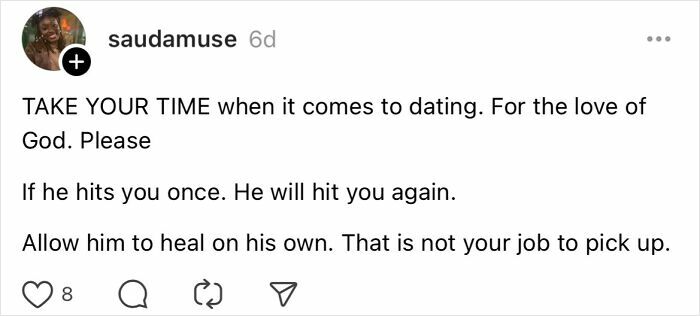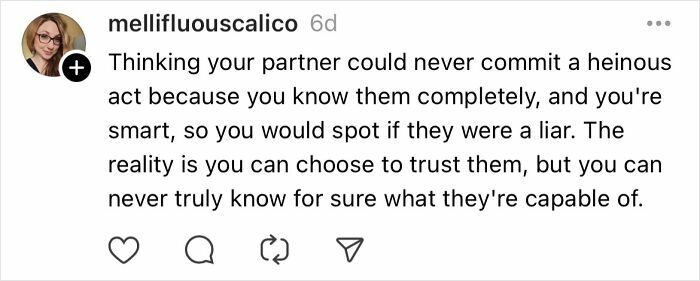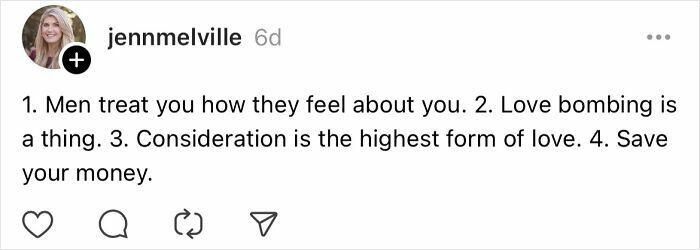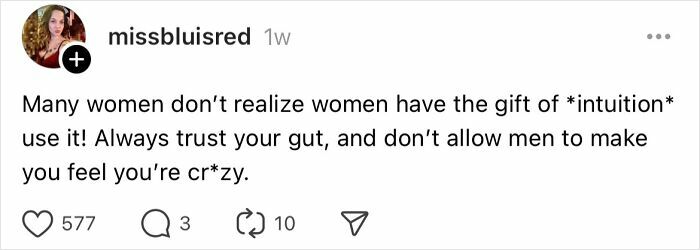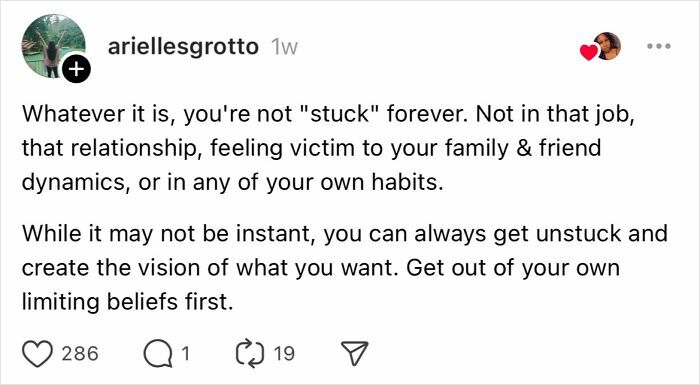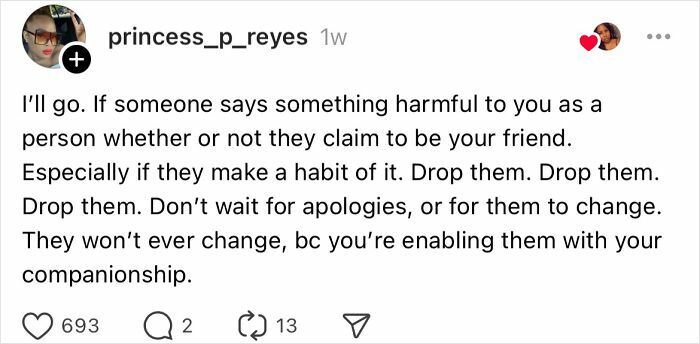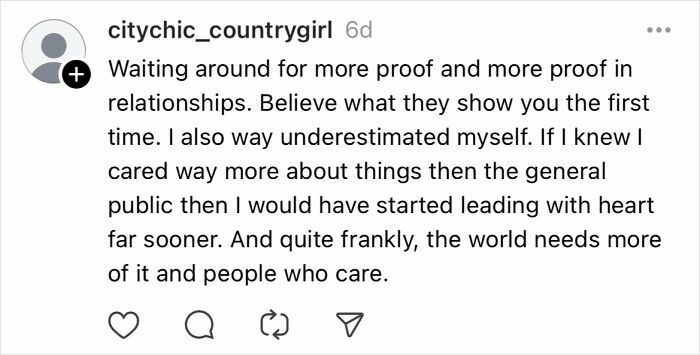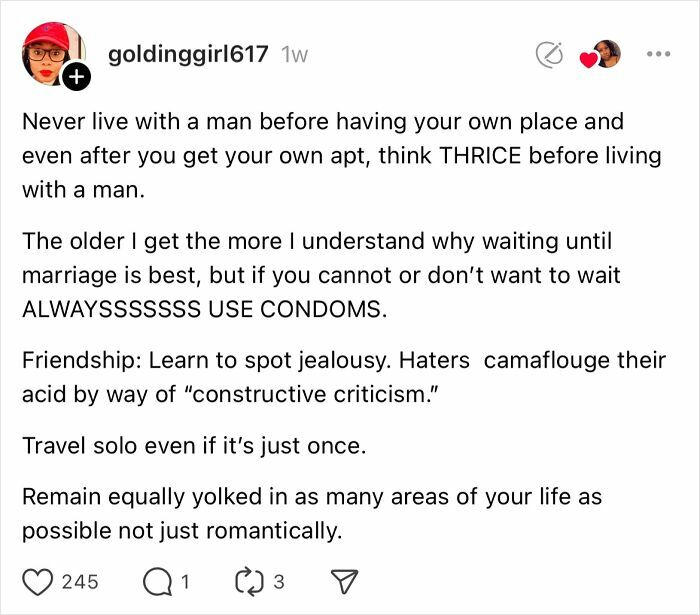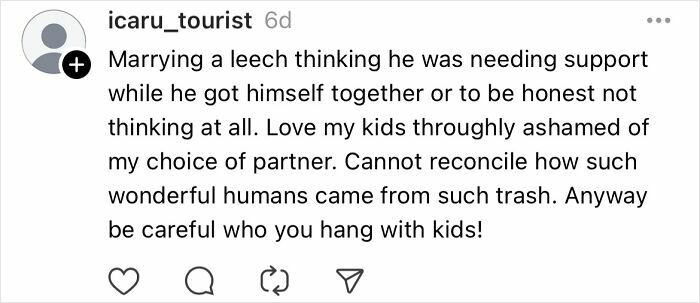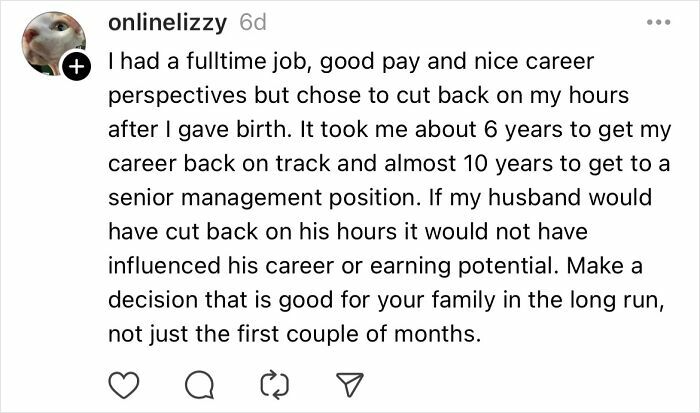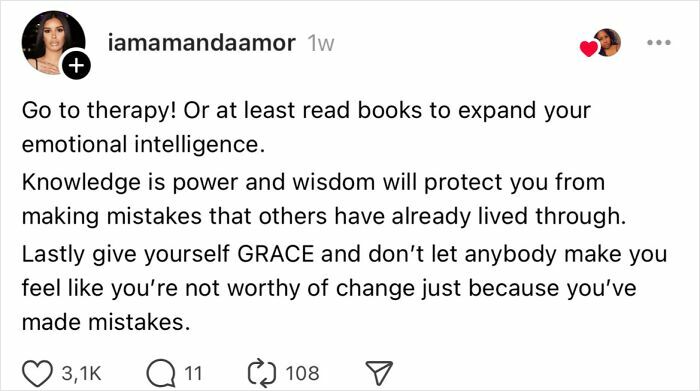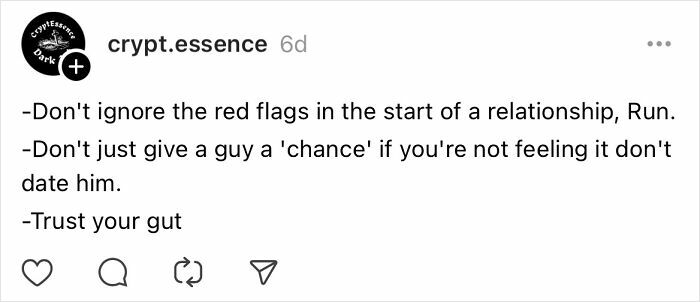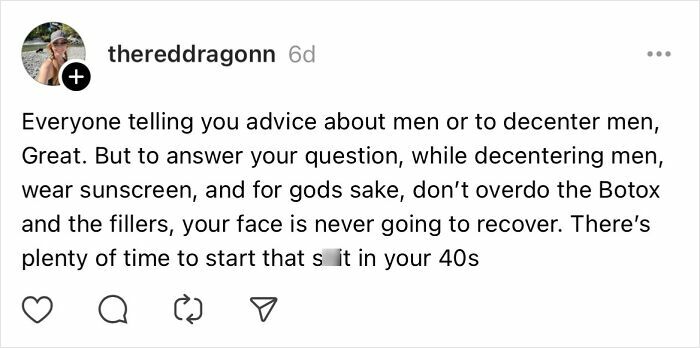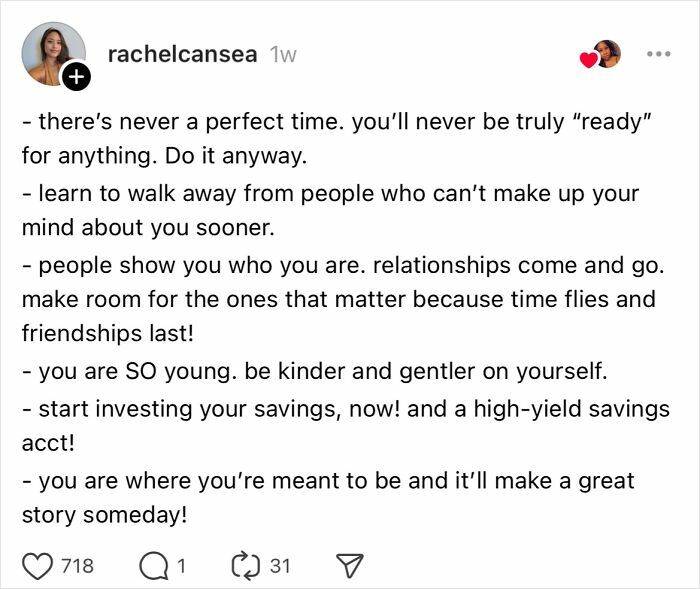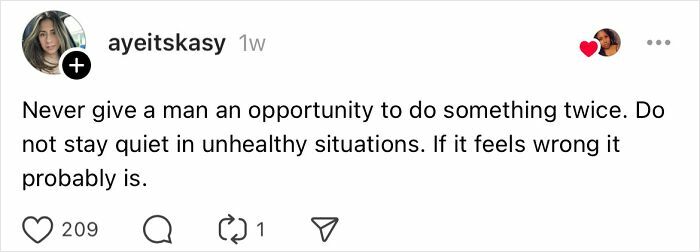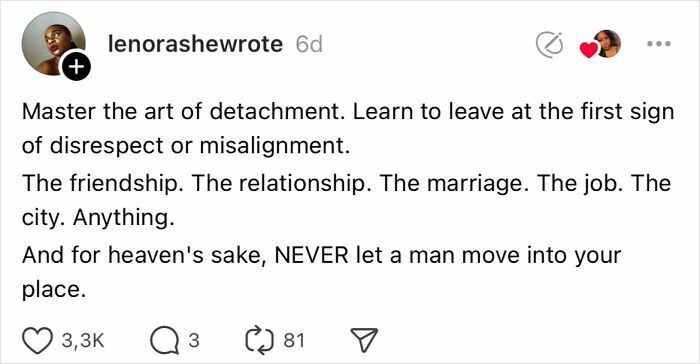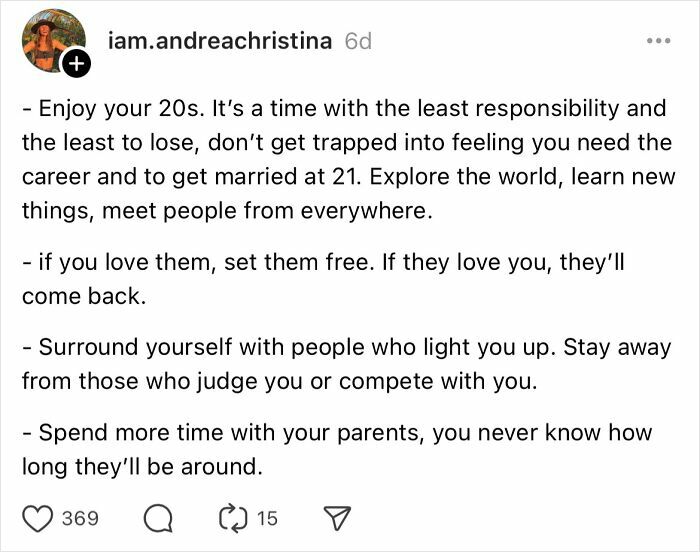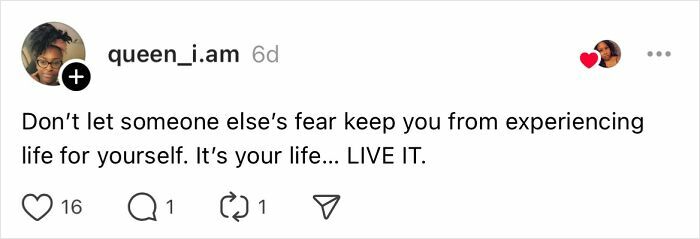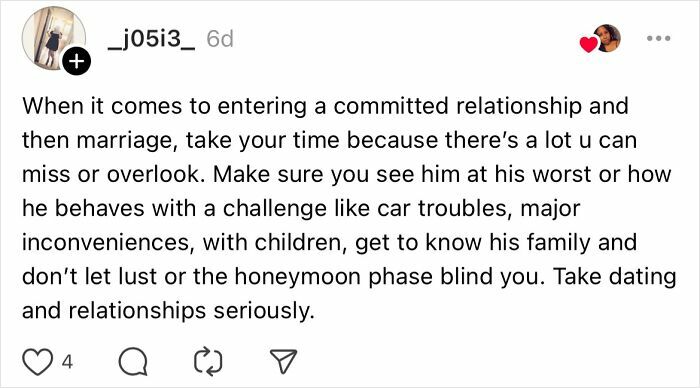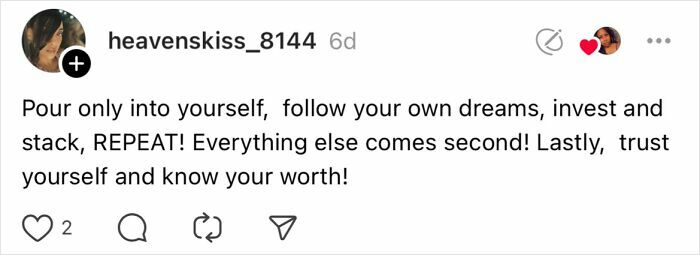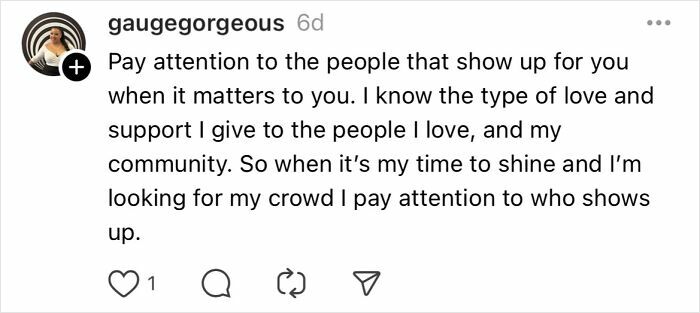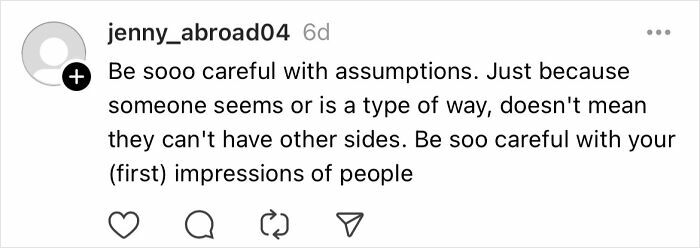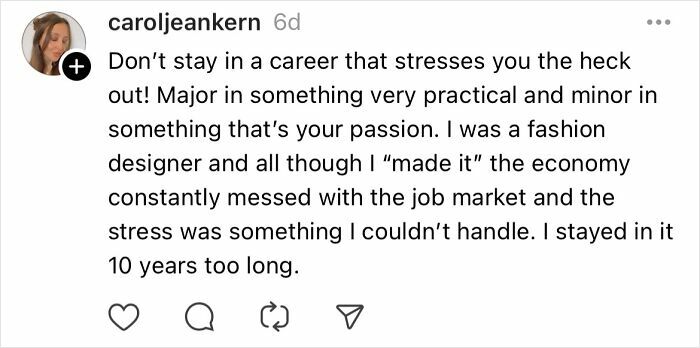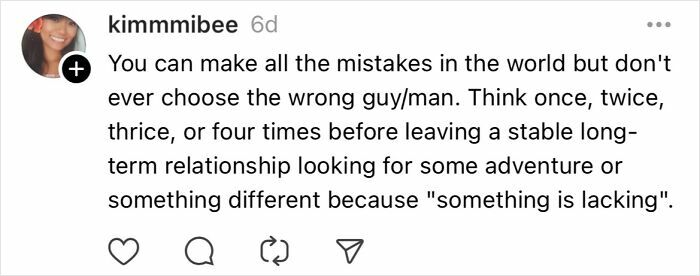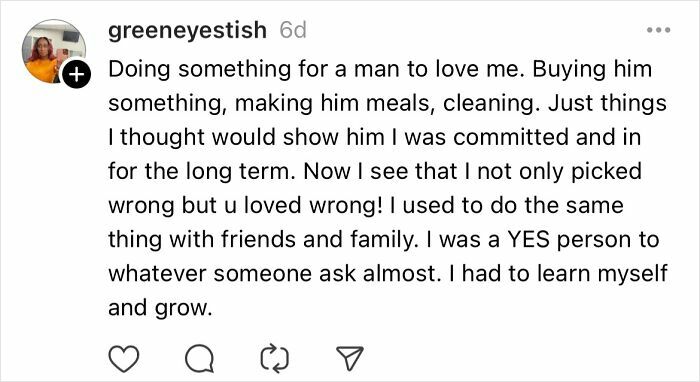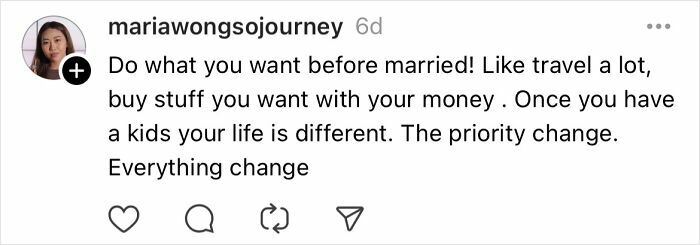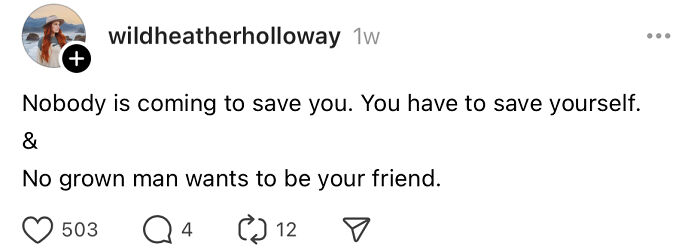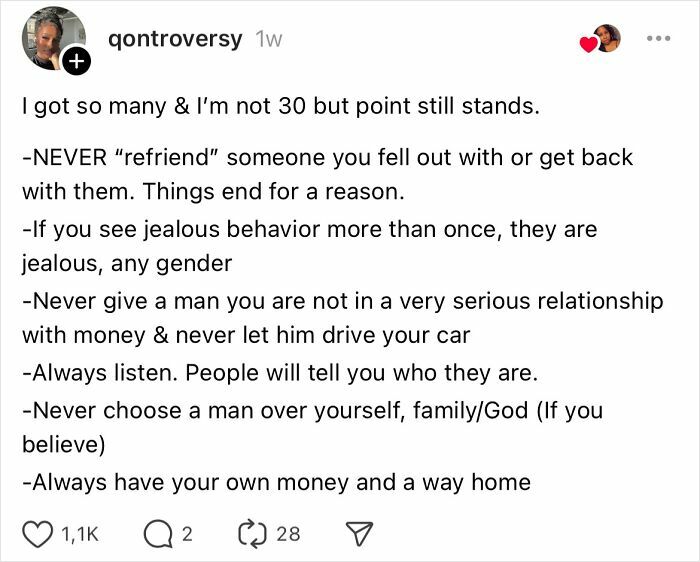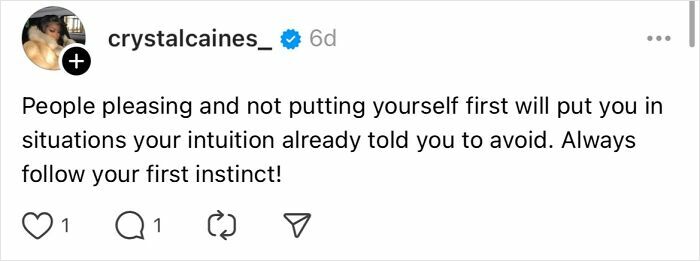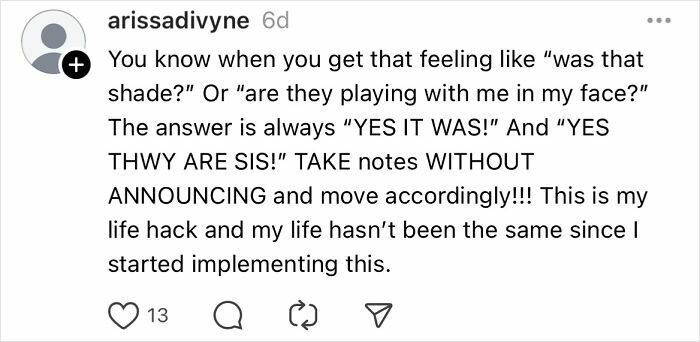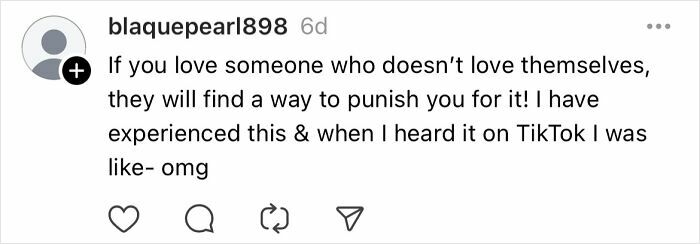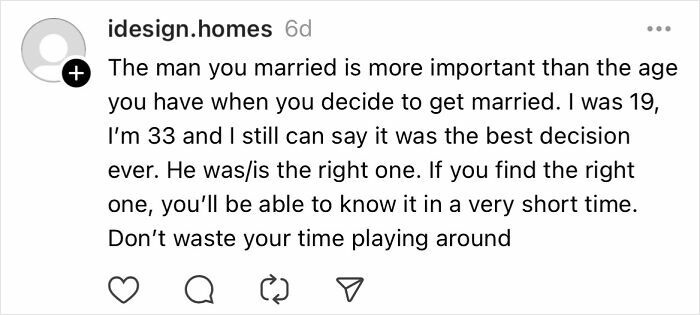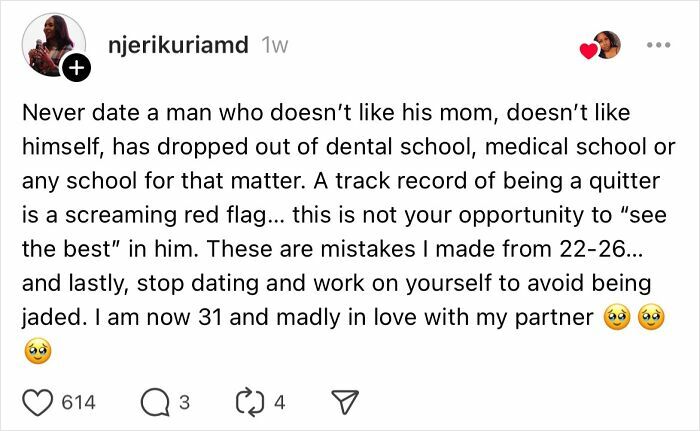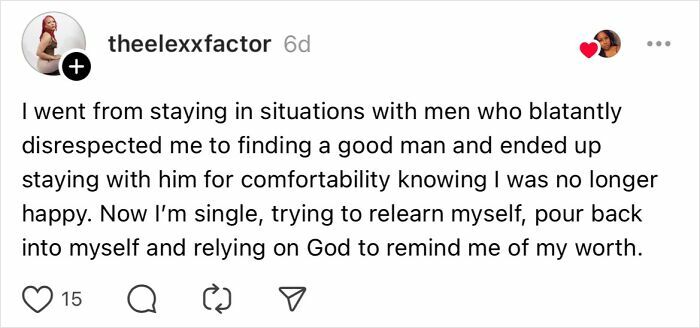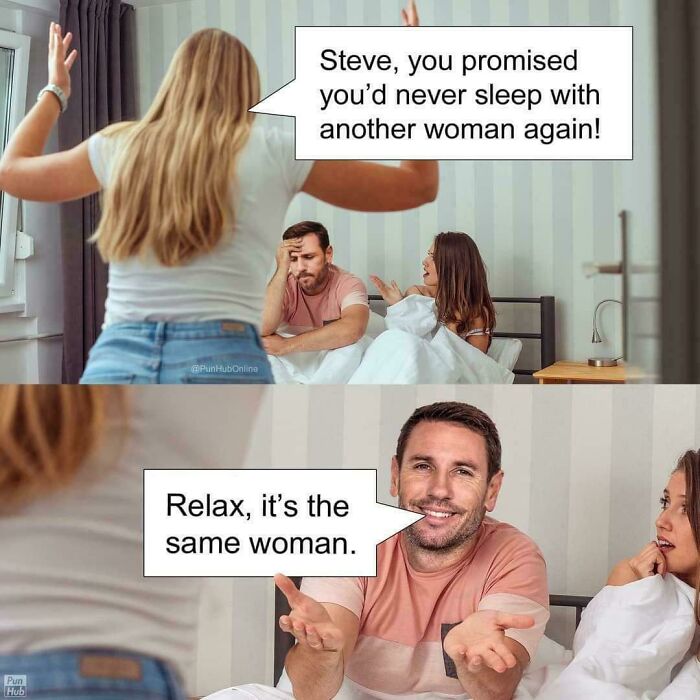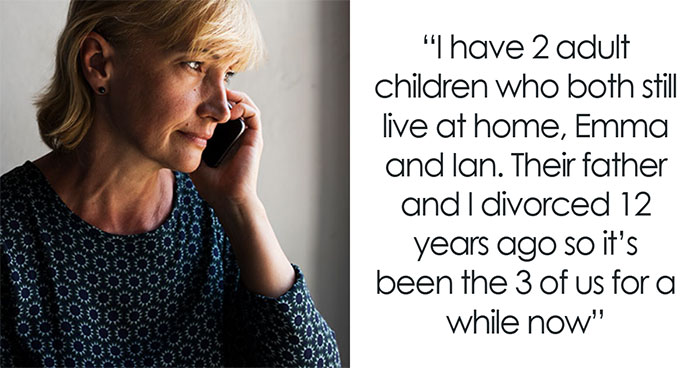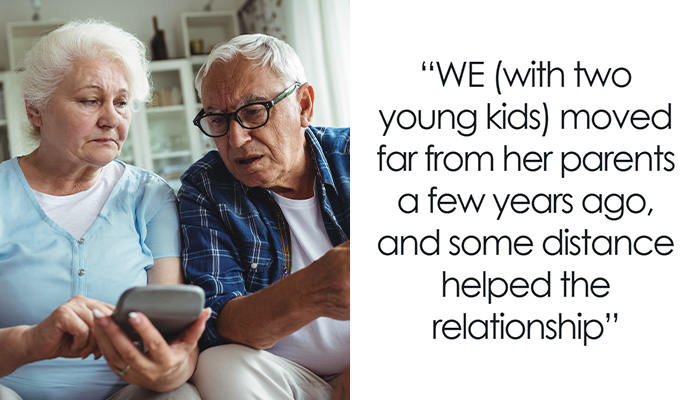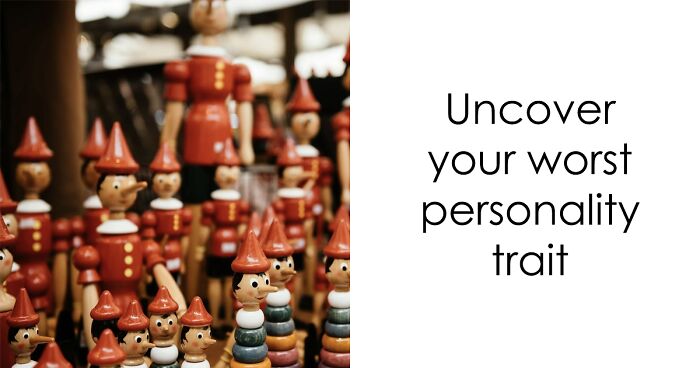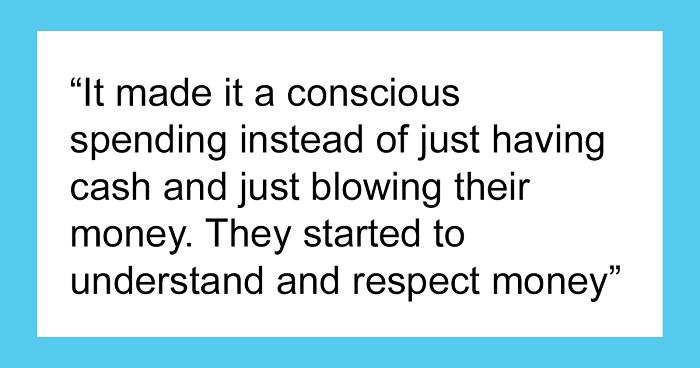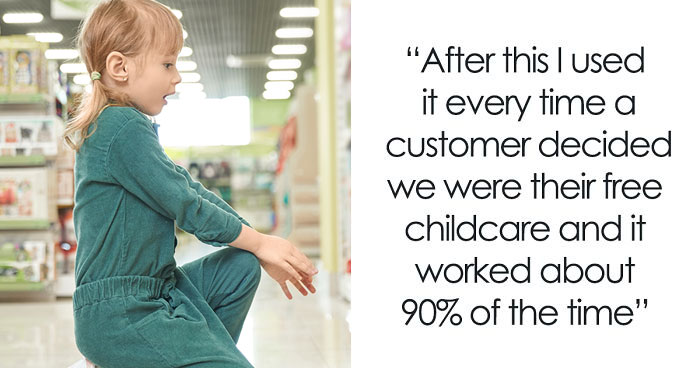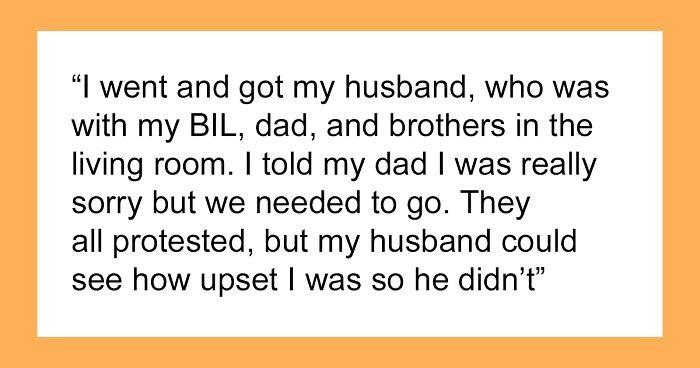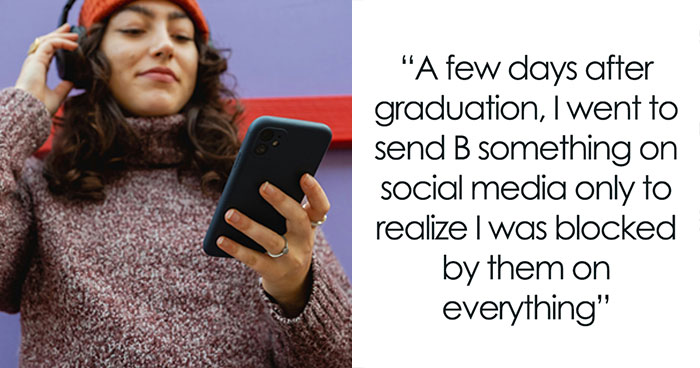Living a good, purposeful, and meaningful life is something that most of us aspire to do. However, sometimes analysis paralysis sets in when you see so much overwhelming advice floating around online. One way to tackle this issue is to consider which things you’d probably regret (not) doing as the years roll by.
Internet user April (@a.badu_) recently went viral on Threads, Instagram’s app where everyone can share public conversations, after asking women who are 30 and over to reveal their top mistakes in life. April’s goal was to help young women out so they don’t make other people’s blunders. You’ll find everyone's helpful advice as you scroll down.
This post may include affiliate links.
Yes! Think of the person and how they treat you and ask yourself "If we weren't related is this someone I'd choose to have around me?".
This. Any one who speaks poorly of every ex… there is a common denominator
The discussion went viral very quickly. At the time of writing, April’s post on Threads had 10k likes, over 3.1k comments, and over 785 reshares. The author said that she was surprised by how “this blew up overnight.” She said she was “overwhelmed with the responses” and promised to read through every single person’s replies.
Bored Panda has reached out to April, and we’ll update our article once we hear back from her.
Depend on people trying to help you with a problem. Develop independence from the person presenting the problem.
As a rule of thumb, people tend to regret the things they didn’t do rather than the mistakes they’ve made. Whatever you choose to do for work or school, there are a few non-negotiables that everyone should prioritize—your social life, health, and fitness. And they form a solid foundation that you can rely on to make the most of life. When you have a strong social circle that supports you and you’re physically and mentally fit, you can take advantage of more opportunities, bouncing back quicker after any defeats.
I use "Sorry, no. But thanks so much for the compliment!" I omitted the second sentence when the father of one of my students invited me to a meeting of his religious cult (Opus Dei).
After decades and decades of research, scientists at Harvard found that it’s your positive relationships that make you happier, healthier, and help you live longer—not exercise, healthy eating, money, or your career achievements.
That’s not to say that looking after your health isn’t important (it is!) or that you shouldn’t budget, save, and invest (you should!), but simply that your social fitness is extremely valuable.
In short, when you consistently invest in maintaining meaningful relationships and minimize interactions with negative people, you become more resilient to stress.
Oh, he has! He just hasn't informed his wife 🙄 Jeez, the popularity of polyamori is a godsend for those mfs
After living through my dad wiping out my parents' joint bank accounts and leaving, and my mom being mostly a homemaker - I will never rely on anyone for money. I vowed to always make my own, no one touches it, its always separate, and enough to support me and whoever relies on me (cats). Currently, my mother is married to a wealthy man. She is taken care of, but he uses his money to control her. Money is freedom. As much as I want to respect stay at home moms, I can't help but see the danger in it.
Dr. Robert Waldinger, the director of the Harvard Study of Adult Development, noted that there is a strong association between happiness and close relationships with spouses, family, friends, and social circles.
“Personal connection creates mental and emotional stimulation, which are automatic mood boosters, while isolation is a mood buster.”
Appropriate and beneficial self-focus has nothing to do with selfishness. If it does, you're doing it wrong.
Goes along with 'Look after your teeth'.... Your older self will thank you for both!
Meanwhile, when it comes to your health, aim to sleep between 7 and 8 hours every night, drink 2 to 3 liters of water daily, and aim for at least 150 minutes of moderate-intensity physical activity per week.
The CDC also recommends that adults need at least 2 days of muscle-strengthening activity each week.
What you don’t do also matters. You should avoid drinking alcohol, smoking, and eating ultra-processed foods.
No matter who you are, the clearer you are about your values and goals in life, the easier it is for you to make better decisions. On the flip side, if you don’t know what you want or what you stand for, you’re likely to go with the flow and end up in situations that might not be optimal.
For instance, if you theoretically value your family and time with loved ones but barely find any time for them due to your work, you need to either prioritize your relationships again or be honest with yourself about the importance of your financial and career goals.
And this is also true for your parents, kids, friends, neighbours. That's why you should never be a fake alibi for a partner/friend/family member who is accused of sexual abuse. Just because someone is an angel towards you, doesn't mean they're not a devil towards someone else.
Lol, i first read this as 'decanter'. Pour those men from the bottle and let them aerate.
I mean, I did this. And all I got out of it was a husband of five years and two beautiful little boys.
Of course, it’s impossible to perfectly ‘optimize’ your life, and you’ll end up making mistakes either way. But if you see failure as a learning opportunity, you can pivot toward where you want to go instead of beating yourself up over having stumbled a bit. Newsflash—everyone, absolutely everyone, messes up sooner or later.
It’s healthiest to embrace what’s happened and move on. Otherwise, you’ll end up feeling guilty and haunted by your past every step of the way.
Doing things ‘well enough’ instead of ‘perfectly’ can leave you with more time, energy, and resources for other endeavors so you can enjoy yourself. Sometimes, trying to get the best possible outcome in every area of your life is, paradoxically, worse for you because you’ll end up exhausted. This approach, called ‘satisficing,’ is a decision-making strategy where you aim for satisfactory results rather than optimal solutions. And it's something that not only companies and managers do, but regular people can also apply to their lives to get good results without burning out. You can apply this when it comes to your finances, career, fitness, relationships, and, well, anything else you care about.
“Instead of putting maximum exertion toward attaining the ideal outcome, satisficing focuses on pragmatic effort when confronted with tasks. This is because aiming for the optimal solution may necessitate a needless expenditure of time, energy, and resources,” Investopedia explains.
Satisficing, as a decision-making process, was a term first coined in 1956 by US scientist and Nobel laureate Herbert Simon. The general idea is that consumers facing a large number of choices will opt for something that is ‘good enough’ and that satisfies their main minimum needs instead of wasting too much time and energy on looking for what might objectively be the ‘best.’
However, satisficing, as a process, isn’t bulletproof. It’s not quite clear what a satisfactory result entails exactly. It’s also not clear how the end result differs from pursuing an optimal outcome. But broadly speaking, satisficers have an internal threshold in their minds that, once met, makes them choose something. Meanwhile, maximizers conduct an exhaustive search of options at a bigger cost.
When applied to your relationships, health, career, etc., satisficing can motivate you to invest in what’s necessary without waiting for the ‘perfect’ moment to do so. Doing even a bit of a good thing is far better than doing nothing, after all.
So many of these are obvious to those of us who have made mistakes. But when you're young you don't see it so clearly. 'I'm different'. 'He's different'. 'It will be different for us....' NO, it won't. LISTEN to those who've been there - PLEASE.
As an old woman now the most important advice I would give to any other woman is....BE SAFE. Above all else put your safety first.
Your colleagues are your colleagues. They are not your family and often not really your friends. I mean, you like to see them, you talk about work things and sometimes personal things, you do small favours for each other (like switching shifts or bring each other a coffee), but if you do not go for a beer after work or call them when you have a personal problem (except switching shift), they are not your friends, only colleagues. You don't own them staying in the toxic job that underpays you all. Feel free to leave. Send your CV wherever you can, take a free week, spend first day taking care of yourself and then go to interviewes. The hardest part is realizing that you have to leave AND that you can leave. It is hard, but it is worth it.
So many of these are obvious to those of us who have made mistakes. But when you're young you don't see it so clearly. 'I'm different'. 'He's different'. 'It will be different for us....' NO, it won't. LISTEN to those who've been there - PLEASE.
As an old woman now the most important advice I would give to any other woman is....BE SAFE. Above all else put your safety first.
Your colleagues are your colleagues. They are not your family and often not really your friends. I mean, you like to see them, you talk about work things and sometimes personal things, you do small favours for each other (like switching shifts or bring each other a coffee), but if you do not go for a beer after work or call them when you have a personal problem (except switching shift), they are not your friends, only colleagues. You don't own them staying in the toxic job that underpays you all. Feel free to leave. Send your CV wherever you can, take a free week, spend first day taking care of yourself and then go to interviewes. The hardest part is realizing that you have to leave AND that you can leave. It is hard, but it is worth it.

 Dark Mode
Dark Mode 

 No fees, cancel anytime
No fees, cancel anytime 




